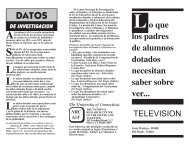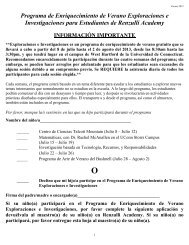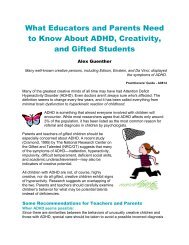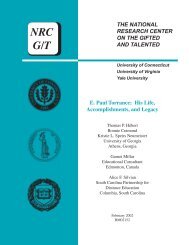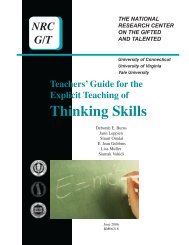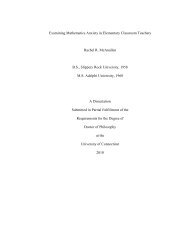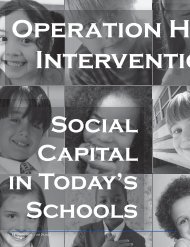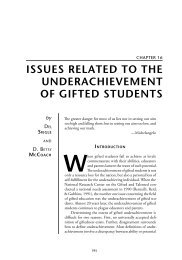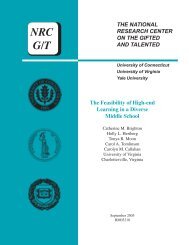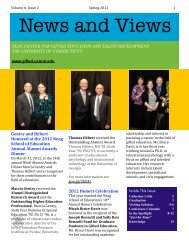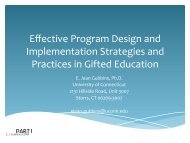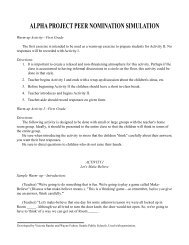Giftedness and High School Dropouts - Neag Center for Gifted ...
Giftedness and High School Dropouts - Neag Center for Gifted ...
Giftedness and High School Dropouts - Neag Center for Gifted ...
Create successful ePaper yourself
Turn your PDF publications into a flip-book with our unique Google optimized e-Paper software.
11<br />
accommodate a variety of learning styles can also be a positive factor according to Hertz<br />
(1989). Ford (1994) identified social environment, family, personality, <strong>and</strong> attitude<br />
toward school as factors that could help identify potential dropouts from gifted programs.<br />
Many of these factors may also be applicable to dropouts from high school. Roderick<br />
(1991) found that dropout rates increased after transition periods, such as moving from<br />
one school to another. She also found that, even after controlling <strong>for</strong> background <strong>and</strong><br />
school per<strong>for</strong>mance, students who had repeated grades were substantially more likely to<br />
drop out, regardless of when the grade retention had occurred.<br />
<strong>Gifted</strong> <strong>Dropouts</strong><br />
Some research studies focused on gifted dropouts. Nyquist (1973) reported that<br />
in New York State 55% of gifted children were underachieving <strong>and</strong> 19% of high school<br />
dropouts were gifted. Robertson (1991) reported that 25% of all students drop out of<br />
school by age 16, <strong>and</strong> between 18% <strong>and</strong> 25% of gifted <strong>and</strong> talented students drop out.<br />
Solorzano (1983) reported that up to 18% of all high school dropouts are gifted students.<br />
The Marl<strong>and</strong> report (cited by Irvine, 1987) stated that 18% of dropouts are gifted.<br />
However, Irvine (1987) criticized this finding, saying, "We don't know how many gifted<br />
students drop out, but it's not 18 percent. The Marl<strong>and</strong> Report (1972) was incorrectly<br />
interpreted that approximately 18 percent of high school dropouts are gifted" (p. 79).<br />
Although the estimates of gifted dropouts vary, some researchers indicated that a<br />
high percentage of high school dropouts have the ability to graduate from high school <strong>and</strong><br />
perhaps even to further their education (French, 1969; Nyquist, 1973). Howard <strong>and</strong><br />
Anderson (1978) indicated that approximately 11% of dropouts have the ability to<br />
complete college. Robertson (1991) indicated that this group represents a major loss of<br />
potential to self <strong>and</strong> society; however, there is very limited research about this group.<br />
Characteristics of <strong>Gifted</strong> <strong>Dropouts</strong><br />
While research studies generally indicated that gifted dropouts have<br />
characteristics of maladjustment, poor self-concept, problems with authority, resentment,<br />
non-con<strong>for</strong>mity, hostility, over sensitivity, <strong>and</strong> egotism (Betts & Neihart, 1988; Davis,<br />
1984; Johnson, 1970; Vaughan, 1968), others have suggested that gifted dropouts are<br />
qualitatively different from other students <strong>and</strong> have different developmental needs<br />
(Robertson, 1991; Zaccaria & Creaser, 1971).<br />
In his case study of gifted high school dropouts, Sadowski (1987) listed the<br />
following characteristics:<br />
(a) there was evidence of instability in the home environment, (b) drug <strong>and</strong><br />
alcohol consumption [was] a part of the dropout's environment, (c) gifted<br />
dropouts exhibited a lack of interest <strong>and</strong> motivation in high school, (d) there was<br />
evidence of a negative <strong>and</strong> rebellious attitude towards school <strong>and</strong> authority, (e)<br />
there was evidence of an incomplete or inappropriate gifted curriculum in high



